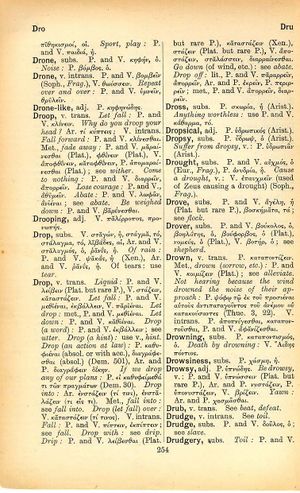drown: Difference between revisions
From LSJ
Καλὸν τὸ θνῄσκειν, οἷς ὕβριν τὸ ζῆν φέρει → Quis foeda vita restat, his pulchrum est mori → Wem das Leben Schmach bringt, dem ist Sterben schön
(CSV4) |
m (Woodhouse1 replacement) |
||
| Line 1: | Line 1: | ||
{{Woodhouse1 | {{Woodhouse1 | ||
|Text=[[File:woodhouse_254.jpg|thumb|link={{filepath:woodhouse_254.jpg}}]] | |Text=[[File:woodhouse_254.jpg|thumb|link={{filepath:woodhouse_254.jpg}}]] | ||
P. καταποντίζειν. | ===verb transitive=== | ||
Met., | |||
[[prose|P.]] [[καταποντίζειν]]. | |||
Met., [[drown]] ([[sorrow]], etc.): [[prose|P.]] and [[verse|V.]] [[κοιμίζειν]] ([[Plato]]); see [[alleviate]]. | |||
[[not hearing becausethe wind drowned the noise of their approach]]: [[prose|P.]] [[ψόφῳ τῷ ἐκ τοῦ προσιέναι αὐτοὺς ἀντιπαταγοῦντος τοῦ ἀνέμου οὐ κατακούσαντες]] ([[Thucydides|Thuc.]] 3, 22). | |||
===verb intransitive=== | |||
[[prose|P.]] [[ἀποπνίγεσθαι]], [[καταποντοῦσθαι]], [[prose|P.]] and [[verse|V.]] [[ἀφανίζεσθαι]]. | |||
}} | }} | ||
Revision as of 08:53, 20 May 2020
English > Greek (Woodhouse)
verb transitive
Met., drown (sorrow, etc.): P. and V. κοιμίζειν (Plato); see alleviate.
not hearing becausethe wind drowned the noise of their approach: P. ψόφῳ τῷ ἐκ τοῦ προσιέναι αὐτοὺς ἀντιπαταγοῦντος τοῦ ἀνέμου οὐ κατακούσαντες (Thuc. 3, 22).
verb intransitive
P. ἀποπνίγεσθαι, καταποντοῦσθαι, P. and V. ἀφανίζεσθαι.

